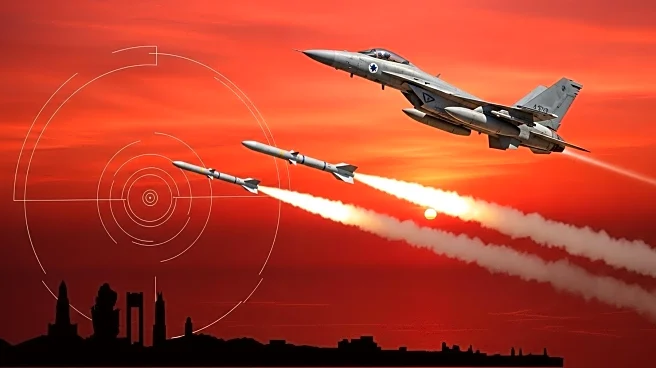What is the story about?
What's Happening?
Israeli fighter jets launched ballistic missiles from the Red Sea targeting Hamas leaders in Qatar, according to a U.S. defense official. The attack, which occurred on September 9, resulted in six fatalities in Doha, Qatar's capital. This strike disrupted diplomatic efforts mediated by Qatar to establish a ceasefire in the ongoing Israel-Hamas conflict. The missiles were fired in a manner designed to bypass Qatar's air defenses and avoid entering the airspace of surrounding Middle Eastern nations. The attack has raised concerns among other countries in the region about potential future strikes.
Why It's Important?
The use of ballistic missiles from the Red Sea represents a significant escalation in military tactics, potentially altering regional security dynamics. This method allows Israel to conduct strikes without violating the airspace of neighboring countries, which is crucial for maintaining diplomatic relations, particularly with Saudi Arabia. The incident underscores the complexity of the Israel-Hamas conflict and the challenges in achieving a ceasefire. It also highlights the limitations of existing air defense systems in the region, prompting concerns about the effectiveness of current security measures.
What's Next?
The attack may lead to increased tensions in the Middle East, with potential diplomatic repercussions for Israel and Qatar. The incident could prompt regional powers to reassess their defense strategies and airspace monitoring capabilities. Additionally, the strike may influence ongoing negotiations for peace and diplomatic recognition between Israel and other Gulf countries. The international community may call for renewed efforts to mediate the conflict and prevent further escalation.
Beyond the Headlines
The strike raises ethical and legal questions about the use of advanced military technology in conflict zones. It may also impact long-term geopolitical alliances and influence the development of missile defense systems in the region. The incident could lead to a reevaluation of international norms regarding airspace sovereignty and the use of ballistic missiles.















